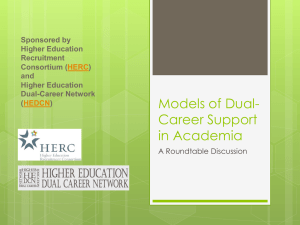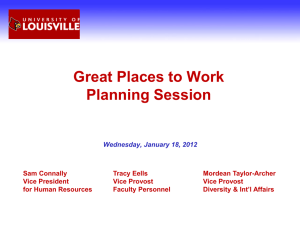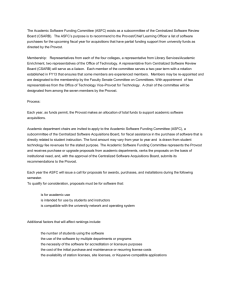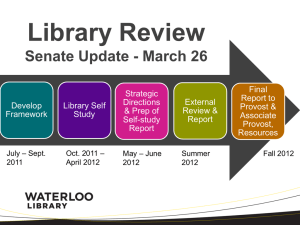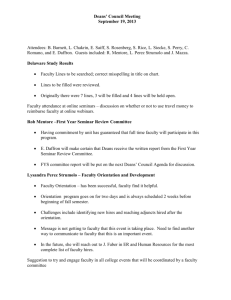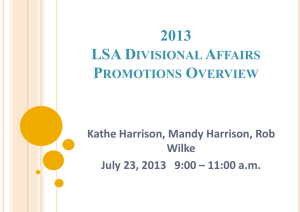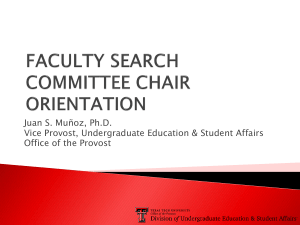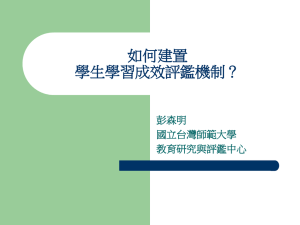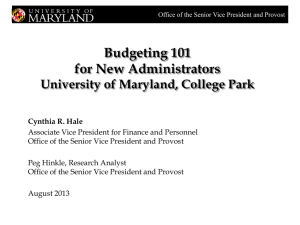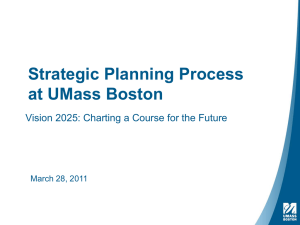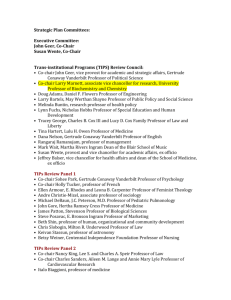Powerpoint Academic Assessment TF Report
advertisement
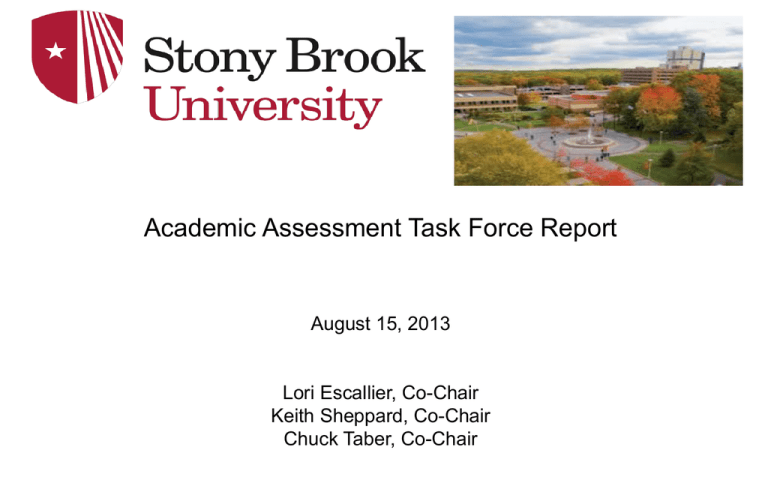
Academic Assessment Task Force Report August 15, 2013 Lori Escallier, Co-Chair Keith Sheppard, Co-Chair Chuck Taber, Co-Chair Committee Members Patricia Aceves Henry Bokuniewicz Dan Davis Terry Earley Agnes He Imin Kao Maurice Kernan Peter Khost Peter Kuemmel Joe Lauher Manny London Wei-Hsin Lu Richard Morgan Marvin O’Neal Dave Paquette Charlie Robbins Paul Schreiber Christopher Sellers Lauren Tacke-Cushing 2 PROVOST’S CHARGE 1. Communicates that academic assessment is an expectation for every program and course. 2. Recognizes those areas in which academic assessment is currently practiced and identifies academic leaders whose experience and expertise could be helpful in rolling these practices out across the board. 3. Create an environment in which faculty can be helped to develop measureable learning outcomes for all programs and propose specific mechanisms for helping them reach that goal. 4. Develop a timetable by which all programs will be held accountable for having written learning outcomes and a way to measure them. 5. Ensure that those programs with external accreditation are in fact practicing continuous academic assessment (and not just in anticipation of an external site visit) 6. Develop institutional academic assessment guidelines that include the documentation of program learning outcomes, plans for the collection of learning outcome data, and a format for reporting on an ongoing basis how learning outcome data are used in decision making. 3 WHAT IS PROGRAM ASSESSMENT? 1. Learning Outcomes/Goals: What do we want students to learn? 2. Metrics/Data/Evidence: How do we know what they are learning? 3. Closing the Loop: How can we modify our programs so students better learn what we want them to learn? 4 SUBCOMMITTEES AND TASKS 1. Collection of Information about Assessment Practices • Investigate program assessment plans on campus (Survey) • Collect examples of program assessment plans from other institutions 2. Metrics/Rubrics • Collect examples of measures and tools used in assessment • Consider resources needed to support assessment 3. Structure • Develop a campus-wide structural plan for assessment at SBU • Identify what programs require assessment 4. Communication • Develop a simple guide to assessment • Consider how assessment requirements should be communicated 5 RECOMMENDATION 1 Establish a permanent Office of Academic Assessment at the university Stony Brook University must establish an infrastructure of personnel and resources to support a culture of assessment campus-wide. Key personnel must be in place as part of the permanent administrative structure of the university. A Director and Assistant Director of Academic Assessment with responsibility for the oversight of all assessment activities across campus should be appointed as soon as possible. Additionally, to support the coordination of data and information we recommend that a data analyst be hired. 6 RECOMMENDATION 2 Appoint Assessment Coordinators in each academic unit The successful introduction of a more formalized assessment initiative requires skilled leadership, the development of open and clear communication pathways and the identification and input of a team of appropriately qualified faculty. The goal is to develop a university-wide culture, which recognizes that the mission of providing comprehensive, high quality education is promoted by the incorporation of rigorous assessment practices into academic programs. A key factor in this development is the appointment of personnel to act as assessment coordinators. 7 RECOMMENDATION 3 Establish a university-wide committee for the purpose of ongoing communication and policymaking regarding assessment There is a need for ongoing communication regarding assessment activities campus- wide. This committee will provide a forum for the exchange of information, ideas and practices of academic assessment. This committee should serve in an advisory capacity to the Provost and should formally incorporate representation from the Standing Committees of the University Senate that deal with undergraduate and graduate education (Undergraduate and Graduate Councils). 8 RECOMMENDATIONS 4, 5, AND 6 Establish a university-wide assessment recognition program Conduct a survey of current assessment practices at SBU When the assessment policy is announced to the university community, it must be simple, flexible, and under the control of each program’s faculty 9 RECOMMENDATION 7 Be very clear on a timeline of activities and provide the necessary resources for timely progression. It is very important that the administration signal the importance of academic assessment by committing the necessary resources to support the activities as described in earlier recommendations. We must strive to have these resources in place in sync with the timeline expected for program faculty to follow in creating their plans. 10 SUPPORTING MATERIALS 1. Survey Instrument for current SBU assessment 2. Collection of examples of assessment plans, including detailed evaluation of AAU assessment plans 3. An Introduction and Guide to Outcomes-Based Assessment 4. Proposed Timeline 11 TIMELINE: MARCH 2013 TO OCTOBER 2013 Provost forms the Task Force on Academic Assessment Submit sub-group reports Submit Final Report Provost’s Committee Meeting Prepare and submit Task Force Report to Provost Provost adopts Academic Assessment Plan and meets with Deans Begin development of Program Assessment Plans Begin to identify Assessment Coordinators March 2013 April 2013 May 2013 Develop faculty on-line resources June 2013 Formation of sub-groups for academic assessment Work on final report and supporting materials Define tasks for sub-groups Appoint Assessment Coordinators Prepare subgroup reports Conduct faculty development workshops July 2013 August 2013 September 2013 Assessment Coordinator within each unit develops a meeting Schedule Convene Provost Joint Committee on Assessment Begin development of Program Learning Outcomes Begin development of Program Assessment Plan Conduct faculty workshops 12 October 2013 Provost’s Committee Meeting October 15, submit Program Learning Outcomes Begin development of Student Learning Outcomes for courses. Conduct faculty workshops TIMELINE: NOVEMBER 2013 TO JUNE 2014 Provost’s Committee Meeting Development of Student Learning Outcomes Conduct faculty development workshop November 2013 January 15, 2014: Submit Student Learning Objectives for all courses, spring 2013, fall 2013, and spring 2014 linked with program outcomes. Document & submit evidence and analysis of at least one program Conduct faculty development workshop December 2013 Continue committee work and development of Student Learning Outcomes Provost’s Committee Meeting Conduct faculty development workshop January 2014 February 2014 Stony Brook University Middle States re-accreditation Spring 2014 Semester: Document evidence of quality improvements based on data analysis Provost’s Committee Meeting Provost’s Committee Meeting March 2014 Provost’s Committee Meeting April 2014 Provost’s Committee Meeting Conduct faculty development workshop 13 May 2014 June 2014 Provost’s Committee Meeting
